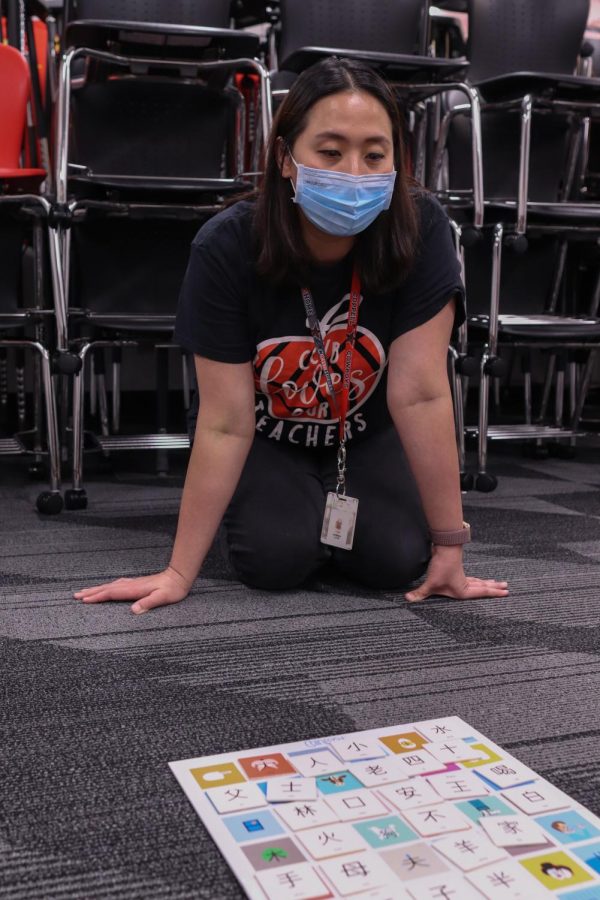Teacher of the Issue: Voelker celebrating Chinese culture through engagement
Coppell High School Chinese teacher Angela Voelker plays Chineasy Tiles to help identify words and terms in C133 with her Chinese I class during her eighth period on March 11. Voelker was selected by The Sidekick staff as the fifth Teacher of the Issue for the 2020-21 school year. Photo by Lilly Gorman
April 6, 2021
Coppell High School AP and honors Chinese teacher lived in Taiwan until 2005; there she studied finance and business management at Providence University. After moving to the United States, she became a vendor manager for an international trading company and started teaching Chinese at New Tech @ Coppell in 2012. She began teaching stationed at CHS in 2018 and utilizes board games and interactive projects to engage students as they learn Mandarin Chinese.
How is your teaching style unique?
Learning Mandarin is so difficult, so I try to make it fun. More engagement is my teaching style. We sing, dance and play a lot of games in my class. This year really hit me because I tried to reach out to kids. Especially [with] a lot of them who don’t like to turn on their camera, I feel like there’s a big wall in between me and the students this year. I try to reach over that wall. [This year], I’ve been trying to play charades with them through Zoom; I really try. I feel like I try twice as much for the result I get, and the result is half of the normal year. This is for all of the teachers, we’ve never experienced it before, and we’re all learning while we’re doing this.
How do you utilize your degrees in teaching?
I come from a business background; I studied finance [at Providence University in Taiwan] and business management in graduate school [at Providence University]. My husband is [New Tech AP World History teacher Garrett Voelker], and he’s the one who guided me and encouraged me to become a teacher. I found that teaching Chinese was very interesting.
Sometimes if kids have math problems they come to me and ask me. [They’ll say], ‘Laoshi [teacher], a house costs you how much money?’ I analyze numbers for them, if you want to live this living style [this is] how much income you should have. We have those discussions.
I had a professional development [about teaching Chinese in foreign countries] over there too. I was away from my family for the last three weeks in August 2019. The Taiwanese government knows there are a lot of people like me teaching Chinese in other countries. In Taiwan they will teach you new ways to make [teaching] better and bring it back to your classroom. I really enjoyed it, and I got to know a lot of Chinese teachers there from Turkey, Mexico and Brazil. I learned a lot of board games to teach Chinese. They show a lot of vocabulary, reading and writing. I brought it back, and I showed it to my department and then they used it too.
Why did you decide to pursue teaching?
In Taiwan, I never thought that I would become a teacher. It feels like my calling because I want my students to know Chinese and my culture. I found my calling. I found the thing that I like to do. When I was in business, I wasn’t happy. When I started to teach, I felt like I was doing something meaningful and something to give back to society. I feel like a lot of stereotypes and discrimination [are prevalent] because we do not know one another. If we know each other better and become more open-minded to other cultures we can decrease discrimination. I don’t think it will disappear, but at least we can listen.
We talk about culture, stereotypes and social issues in our class, so I’m just trying to tell them the whole thing, not just one aspect. In the U.S., I think it’s more important to know China better. Through me, they can see what Chinese people think and why they see things [a certain way].
Follow Victoria (@veh37936) and @CHSCampusNews on Twitter.











